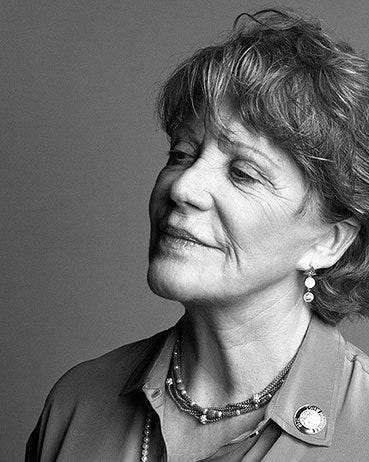Linda Lavin: Cauterizing Agent

Voices, eyes, intentions. There are days when these are the items that comprise my diet. As I search the fog, looking for a new woman to walk me to the stage, to introduce me to a character, I keep listening for a voice that is intuitive and intelligent; aware of secrets and the artifice necessary to cloak them; sharp enough to skim off the fat and bad intentions of all playwrights. Eyes that see too much yet know when to look away—in supplication or seduction or in the awareness that nothing more can be done. Intentions that lead me to believe I can follow and learn more, see things I should; understand, to a greater degree, those things I’ve already seen. I’m being fulsome, but these are things you search for, and you did ask. You find them if you look for them; if you’re lucky; if God or that rare playwright who met a deadline and the rigors of the craft provided an outlet; if you keep looking.
I found all of this when I saw Cop-Out. I went because I love Carrie Nye and I love and envy John Guare. I can’t tell you anything about the text. I can tell you about an absurdity of gesture from Carrie—an intelligent but scornful performance from someone who knows better. I remember clearly Linda Lavin, because she was a cauterizing agent, she beamed a harsh and welcome light of truth from every movement. She had the voice and the eyes and the intentions that got me to the pale judgment again, hopeful that I could write again. The year in which this play opened was a dry one for me, pockmarked with failure and an inflexibility of the mind and the glands, but she was terribly flexible, arching her artistic muscles to bring some truth to that production. I was afraid of her as she lay, seemingly dead, in the aisle of the theatre. I was terribly paranoid in those days, and I thought that John had placed her there, for me, as a gesture, as a rude joke, to imply that I, too, was dead in the theatre, but the gravity of the situation was due to the fact that Linda Lavin is capable of being motionless and humiliated and still illuminating a theatrical experience. This is praise, in case you were confused—as well you should be.
I kept following her. James Coco urged me to see her in the Simon play. I did not want to go. I never do. I do not think plays should be written with the alacrity of cracking nuts by the fire at the Friar’s Club, but I went, because I love Jimmy and because I wanted to see Linda Lavin. … They both got so much beautiful truth out of that play. Resignation, willingness—this fragile pursuit of all things at all times. I want you to know that I did not invest these things or memories into that play—they did. They did that for me.
I even watch her on television, and I’m always finding truth and a combustible talent that needs the lit end of a suitable talent—a talent that she can play with and trust and mount—to allow for the explosion that is coming. It is coming. Anyone who can make me recognize my mother—which is to say Amanda Wingfield—in a television comedy is not to be dismissed.
I’ll go back to the pale judgment and imagine her in new works, but there is so much that she can do. She should bring her withering gifts of observation to Albee, Pinter—Jesus, imagine her in Old Times, or extending a leg in The Homecoming. When she gets older, she would be a frightening—in the best sense of the word—Mrs. Malaprop or Lady Wishfort. She’s aiming for Amanda, however; if she weren’t already a star, she would be a blazing Stella. She is not a suitable Blanche because she is too wise—wisdom and experience are evident in her stride and her intentions, and she would never submit to the degradations of Blanche; she would never submit to Stanley. She has seen and known better, and she would transmit, effortlessly, to any Stanley that the battle may happen, but it will be fatal—for him.


